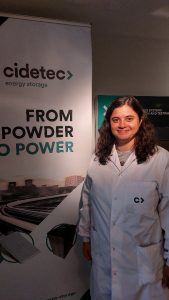Presentation of CIDETEC
CIDETEC is an organization for applied research that integrates three international reference institutes in the fields of Energy Storage, Surface Engineering and Nanomedicine. In the Energy Storage field, our activity covers the entire value chain from material chemistry to final application. We design and develop cells, modules and battery packs tailored to our customers’ needs, with a clear commitment towards technology transfer to industry. CIDETEC Energy storage also participates in different EU granted projects and is a founding member of Battery 2030+ and ETIP Batteries Europe, chairing WG4 – Cell Design and Manufacturing, amongst other initiatives.
WP leader: Susan Sananes Israel
Main contact: ssananes@cidetec.es
Dr. Susan Sananes Israel is a researcher in material chemistry and project manager at CIDETEC Energy Storage, in the Li-ion group. She is leading different projects with private and European partners. She is graduated from the University of Montpellier with a Masters Degree in Material Chemistry for Energy and Sustainability. Her PhD in Material Chemistry, focused on the ion confinement in porous media and fonctionnalisation by Supercritical CO2 was obtained in 2018. She is author and co-author of several publications focused on Li-ion batteries and porous media.

Short interview:
– Why have you chosen to get involved as WP5 leader?
CIDETEC Energy storage has a strong know-how on material processing, electrode formulation and prototype cell assembly. In WP5, the main target is to manufacture cells with all the components (electrodes, electrolyte) developed in WP3 and WP4. We start from the material level, preparing slurries at laboratory scale. Once the formulation is optimised, the electrode slurry is coated at pilot line level and prototype pouch cells can be assembled with all the different chemistries used in the project. The use of novel materials such as Si composites and high Ni NMC materials is very interesting for CIDETEC, to enhance our experience on the processing of novel materials for high energy density applications.
– What do you take out from this WP?
We work in collaboration with industrial centers (VARTA Innovation) and research institutes (Technical University of Munich) in order to find the best cell design, and to manufacture pouch cells with advanced Li-ion chemistry. The development of a prelithiation protocol applicable to pouch cells is also very innovative as, for the moment, this is something that has not been used in commercial cells and results that have been obtained for the moment are very promising. Moreover, this WP also allowed to work on aqueous-based formulations using high-nickel NMC, which can help to build more sustainable batteries in the future.
– What are your expectations from the SPIDER project?
Participating in SPIDER project allow to increase the know-how and capabilities of CIDETEC regarding human ressources, towards the development of new electrodes formulations and protocols with high Ni- NMC materials. SPIDER also enhances the collaboration between all the partners of the consortium, with the common goal to develop a recyclable high energy density cell with a long cycle life. Despite the COVID situation, the coordination of the project with different periodic meetings allowed to have an overview of the recent progresses of the project in all the WP, so as to facilitate the communitacion between the different WP. Moreover, we hosted the 8th SPIDER General assembly in San Sebastián, which gave us the possibility to meet physically and exchange ideas for publications and new collaborations.
Currently, the project is almost finished and we have a very positive impact and exploitable results from SPIDER project, with 1 accepted article (and some others in preparation) so as the participation to 3 conferences.
CIDETEC’s Lab
Name and short description, persons involved etc.
Cidetec energy storage unit is divided into two different units. On one hand, the Unit for Storage Systems, working on a cell to pack level with the design and modelling of future battery packs. On the other hand, the Unit of Materials for Energy that works in different energy storage technologies (Li-ion, Solid State Batteries, Li-sulfur, Ca-ion, fuel cells) from the material scale to the high scale prototype level. In total, there are more than 100 persons working on the research and development of the future batteries. The Li-ion group counts with more than 20 persons, technicians and researchers, that work in collaboration in different private and public-founded projects. We enjoy taking part in SPIDR project and having interactions with the consortium.
Any other info you would like to share
Feel free to visit Cidetec Energy Storage ’s website:
https://energystorage.cidetec.es/en/home
